#i'm not great at fantasy worldbuilding as you can see
Explore tagged Tumblr posts
Note

👀👀👀
(Answer to a very belated AU combo ask game)
Okay I am so sorry this took so long to answer, unfortunately the brain gremlins went on strike :( But I'm here now! This is why I asked you to pick a genre the other night!
Anyway, I guess genre twist just means. same story, new genre? And you gave me urban fantasy, so here goes.
I think this is going to be a world where some people have powers or are human/[something] hybrids (werewolves, etc.), and many of those people are not treated very well. Given that it's a 21st century AU, I don't think it would make sense for the newsies to still work as newsboys, but there would be similarly terrible pay and hours - most of them are magical beings of some sort, and given their age combined with the fact that most magic users/human hybrids face a lot of discrimination, they can really only work awful jobs that pay cash under the table.
Anyway, Davey enters the picture for the same reasons as the original plot (his father getting injured on the job), but maybe he's in a situation where he is a magic user but has been trying really hard to hide it so he can make it in the world? And then pretty soon after Davey joins the group, their employer announces that they'll be taking a bigger chunk out of their pay for tax reasons or whatever (even though they get paid under the table), so the newsies decide to go on strike.
Katherine is still Pulitzer's daughter, but instead of being a journalist I think she works in something to do with unionization/labor relations/non-discrimination clauses, so when it comes out that she's Pulitzer's daughter, Jack thinks she was trying to union-bust from the inside (she wasn't, obviously). But since there still needs to be newspaper coverage of some sort, we'll throw Denton in here just for fun - Katherine is someone he works with pretty regularly when reporting, and he wouldn't get most of the stories he gets without her.
The rest of the plot would be...fairly similar to the original? I'm stuck at home today because I'm sick, so sorry if none of this makes sense.
#asks#ask game#newsies au#newsies#alex!#i hope you enjoy this mess of a concept#i'm not great at fantasy worldbuilding as you can see#and i feel gross. oof ouch my sinuses.#anyway hopefully i feel less sick soon
2 notes
·
View notes
Text
Online Writing Resources #2
Vocabulary:
Tip of My Tongue: I find this very helpful when I can't think of a specific word I'm looking for. Which is often.
WordHippo: As well as a thesaurus, this website also provides antonyms, definitions, rhymes, sentences that use a particular word, translations, pronunciations, and word forms.
OneLook: Find definitions, synonyms, antonyms, and related words. Allows you to search in specific categories.
YourDictionary: This website is a dictionary and thesaurus, and helps with grammar, vocabulary, and usage.
Information/Research:
Crime Reads: Covers crime and thriller movies, books, and TV shows. Great inspiration before writing a crime scene or story in this genre.
Havocscope: Black market information, including pricing, market value, and sources.
Climate Comparison: Compares the climates of two countries, or parts of the country, with each other.
Food Timeline: Centuries worth of information about food, and what people ate in different time periods.
Refseek: Information about literally anything. Provides links to other sources relevant to your search.
Perplexity AI: Uses information from the internet to answer any questions you have, summarises the key points, suggests relevant or similar searches, and links the sources used.
Planning/Worldbuilding:
One Stop for Writers: Literally everything a writer could need, all in one place: description thesaurus, character builder, story maps, scene maps, timelines, worldbuilding surveys, idea generators, templates, tutorials... all of it.
World Anvil: Provides worldbuilding templates and lets you create interactive maps, chronicles, timelines, whiteboards, family trees, charts, and interactive tables. May be a bit complicated to navigate at first, but the features are incredibly useful.
Inkarnate: This is a fantasy map maker where you can make maps for your world, regions, cities, interiors, or battles.
Miscellaneous:
750words: Helps build the habit of writing daily (about three pages). Fully private. It also tracks your progress and mindset while writing.
BetaBooks: Allows you to share your manuscript with your beta readers. You can see who is reading, how far they've read, and feedback.
Readable: Helps you to measure and improve the readability of your writing and make readers more engaged.
ZenPen: A minimalist writing page that blocks any distractions and helps improve your focus. You can make it full screen, invert the colours, and set a word count goal.
QueryTracker: Helps you find a literary agent for your book.
Lulu: Self-publish your book!
See my previous post with more:
Drop any other resources you like to use in the comments! Happy writing ❤
Previous | Next
#writeblr#writing#writing tips#writing advice#writing help#writing resources#creative writing#writer resources#author resources#writer stuff#how to write#writing techniques#story writing#author#author things#writer things#writer help#writing research#vocabulary#deception-united
1K notes
·
View notes
Note
If I could ask you for some advice, what do you think helps the flavour text of a mech or piece of equipment sell a player on the fantasy of using it?
I'm finding it frustratingly difficult to do so with my own homebrew content: I can come up with lore and backstory easily enough, but re-reading it feels dry, and I can't help but contrast it with how the descrptions in official content and other supplements is more evocative, at least for mechs.
Let's observe some corebook Lancer flavour text and examine the various varieties it comes in.
Purely Functional

While it's usually not the most fun type of flavour text, this just tells us what the weapon is, and - if it has any particular tags or on-hit effects - why it's like that. The Hand Cannon is a good example: here's what it is (modified pistol), here's why it does more damage, and here's why it has Loading.
The main advantage of Purely Functional flavour text is that it provides space for other types of flavour text to breathe. Flavour text is a great place for jokes, but it's not good for every piece of flavour text to be a joke - the pauses between notes in music are just as important as the notes.
Obfuscating Vendorspeak

The Bristlecrown Flechette Launcher this is a great example of dark humour that Lancer uses quite often: marketing fast-talk to cover up something really unpleasant. The joke here is based on us understanding precisely what the equipment does mechanically, and then seeing how the manufacturer tries to sell it. There's a bunch of dense technobabble here meant to obfuscate the fact that this weapon fires knives in every direction specifically designed to kill infantry.
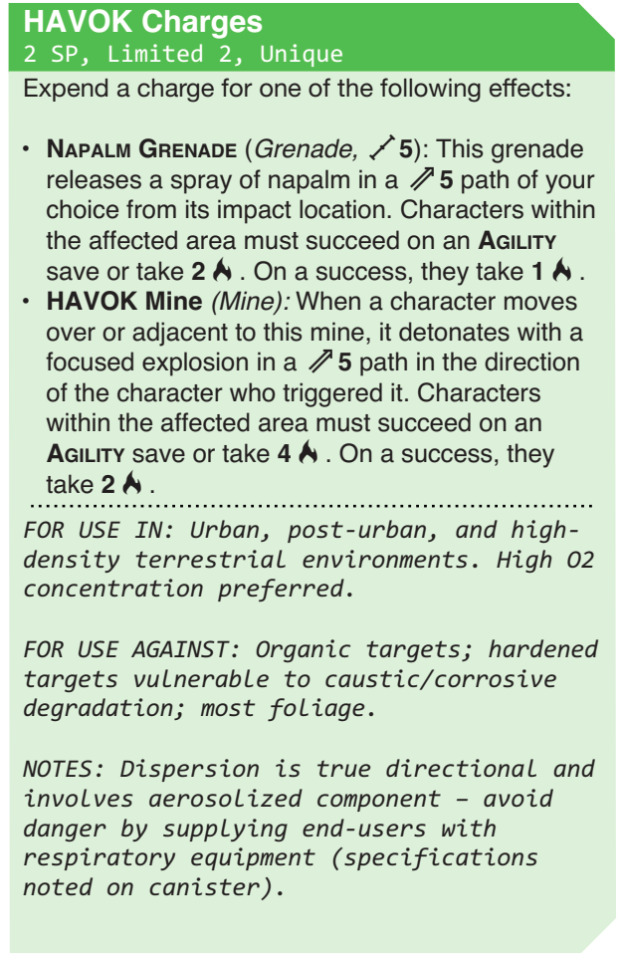
Deadpan Weirdness

The joke here relies on describing something extremely weird like it's the most natural thing in the world. Wait, you're telling me that in a world where I can just print new parts if the old ones break, they put DRM on my fucking knife and I have to apologise to the fucking knife maker to get a new one? What the fuck, dude? Why are you acting like this makes any sense?!

My sword uploads fucking what to the Space Internet?!
Third-Act Twist

This type of flavour text disguises itself as something else - most often Purely Functional - and then hits you with Third Act Twist. It makes you go "wait, what?!" It's very classic setup-punchline stuff. You're telling me my mech can rot?!
As a side note, Lancer loves to use this for its NHPs.

WHY DID YOU PUT THAT IN SCARE QUOTES, LUCIFER
Worldbuilding
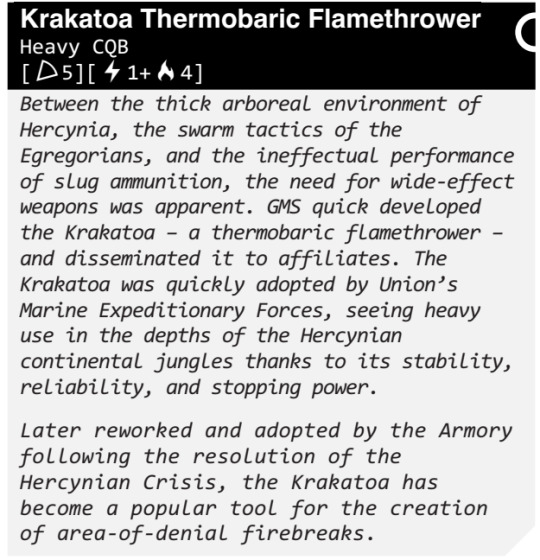
This is similar to the Purely Functional, but instead of just describing technical specifications of the weapons, it puts the weapon in the broader context of the setting's history. Okay, so we know what this weapon is and what it does - why was it built? What was the original use case, and why? Most importantly, what can the existence of this weapon tell us about the world that build it?

Whimsical Aside
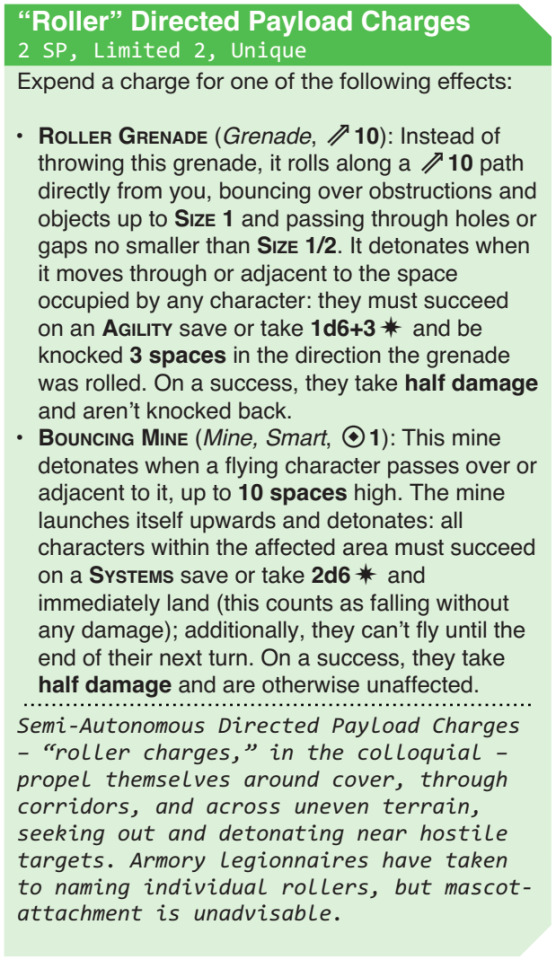
This is the insertion of a light-hearted, humanising little insertion regarding how this piece of equipment gets used in the field. This serves to remind us that soldiers aren't cold, unfeeling killing machines: they can be as emotional, irreverent and silly as the rest of us, and they do things like name their mobile bombs...

... or call resupply drones "mech snacks."
The Ominous Out-Of-Context Quote That Explains Nothing And Only Raises More Questions
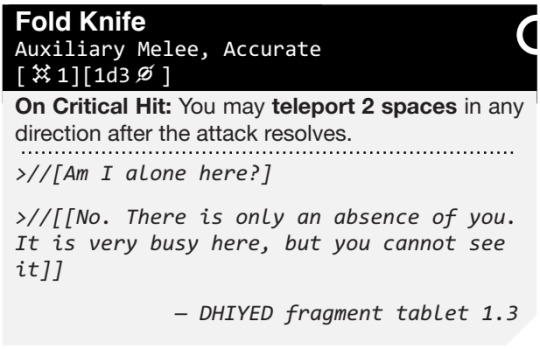
As I've said in multiple textmash memes, this is basically Tom and Miguel's shorthand for "this technology is Intensely Fucked Up in a way that it is more fun and scary not to explain." This is essentially Lancer's version of SCP's [REDACTED].
You might think this is the domain of HORUS, and you'd be right, but every single manufacturer indulges in these - although IPS-N had to wait until NRFaW to get theirs:
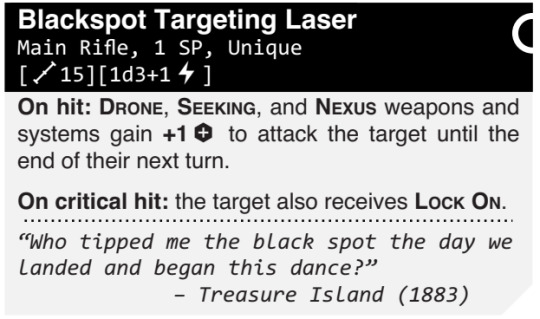
What the fuck do you mean by that, Lancer?
564 notes
·
View notes
Text
why you, yes you, should read the Queen's Thief books
for #WinASignedSetofTheQueensThief2024, I am here to gently yet persuasively yell at you about why you should read the Queen's Thief books, in a helpfully numbered list (no spoilers, only vibes):
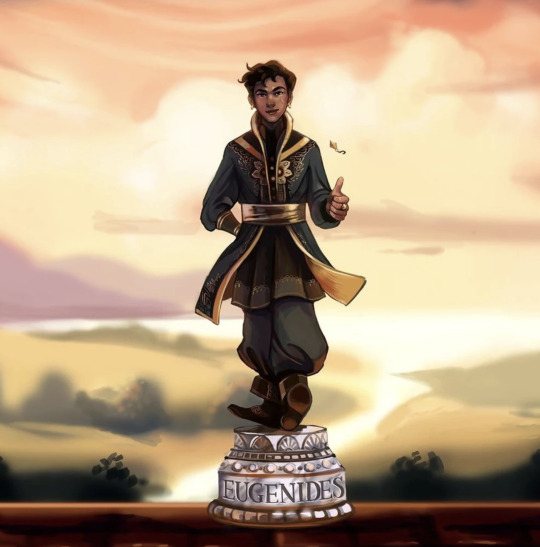
I like unreliable narrators. You like unreliable narrators. You know who the most unreliable narrator is? This scrunkly little guy, blorbo of all time, Eugenides (Gen). You're gonna fall in love with him. You're gonna want to throttle him. It's okay, it happens to us all. (official character art by Emily B. Martin isn't it gorgeous!!!)
Tumblrinas far and wide are known for our love of ancient Greek and Greek-inspired fantasylands. What if I told you that we could have it all (coastal Greek-esque kingdoms, political intrigue, The Gods Are Getting Involved) PLUS there are, occasionally, guns. Yes you heard that right. It's great. Come for the fantasy, stay for the Fantasy Guns(tm).
I could wax poetic about the female lead, Attolia Irene, for approximately 25 years without drawing breath, but suffice it to say she is THEE fantasy queen of all time. Her arc is incredible. I want to be her. I'm scared of her. I adore her. PLEASE read these books so you can also fall head over heels for her.
DYNAMICS!!!!!!!! we have ALL OF THEM. kings and queens and vassals and loyal advisors and scheming diplomats and brave soldiers and anxious scribes and we toss them into a blender and see what happens and who lands where. it is delicious.
Did I mention The Gods Are Getting Involved? the way these books weave the political reality & the godly, mythical, numinous aspects takes my breath away. Truly the blueprint.
Twists and turns that fly by like a rollercoaster. Truly, no one is doing the Plot Twist like MWT. You start out on these books and you think you know where they're going. yOU DO NOT. And you will be delighted every time.
Incredible prose, with occasional excerpts of poetry and song and myth that provide SUCH fertile ground for lore and worldbuilding and delicious, delicious Character Parallels. If you've ever been into classical reception even a smidge, you will rejoice at the plentiful references.
Bro's Road Trip of All Time (book 5) will knock your socks off. If you ever read Eagle of the Ninth, it's kind of like that, but got me even more good. deeply moving, I am never getting over them, (wails to the sky) I just want to be able to read this book for the first time again so YOU SHOULD TAKE THE CHANCE WHILE YOU HAVE IT
anyway, what are you waiting for, go read queen's thief, you will surely not regret it, what are you talking about these books ripped my heart out ha ha ha ha but i mean in a good & fun way okay enjoy!!!!!!!!
226 notes
·
View notes
Note
Hello hello! I absolutely adore your writing, it just feels so complex and the dialogue is so perfect you don't understand, probably my favorite writer in tumblr ^^
Do you have any favorite books? I'm not really into reading but I want to write my own stories, and English isn't my first language so I always try to read but I don't really continue since most of them aren't really in my taste– but I'm willing to try anything you read or take inspiration from since I'll probably like it since I like your work so much :]
Sorry, hope that made sense, ty <3
So, I'd like to think that while my writing has a consistent *vibe* it also covers quite a few different genres and moods that could be what you are interested in. Let's go.
If you like a book rooted in complex, dysfunctional power dynamics try....Summer Sons by Lee Mandelo, The Last Tale of The Flower Bride by Roshani Chokski, The Invisible Life of Addie La Rue by V.E Schwab, Gone Girl or Sharp Objects by Gillian Flynn, Deathless by Catherynne M Valente, If We Were Villains by M.L Rio, The Foxhole Court by Nora Sakovic, Dark Rise by C.S Pascat, Interview with a vampire by Anne Rice, These Violent Delights by Micah Nemerever.
(You can see that complex, dysfunctional power dynamics that are central to the story are basically my favourite thing haha. My absolute jam and butter! The dynamics themselves vary. You may root for some and watch others in delighted horror.)
If you like a great, not a romcom, enemies to lovers romantasy, try...Sorcery of Thorns by Margaret Rogerson, Girl, Serpent, Thorn by Melissa Bashardoust, The Folk of the Air trilogy by Holly Black.
For some fantasy horror vibes, try...Rolling in the Deep by Mira Grant (mermaids!), House of Hollow by Krystal Sutherland, The Hollow Places by T. Kingfisher.
If you want something cute and LGBTQ, try...The House on Cerulean Sea or In the Lives of Puppets by T.J Klune, One Last Stop by Casey McQuiston, Carry on by Rainbow Rowell, anything by F.T Lukens.
For short story collections that make me want to write...Things We Say in the Dark by Kirsty Logan, Salt Slow by Julia Armfield, Through The Woods by Emily Carrol or the multi-author anthology Hag.
And, let's be real, absolutely no one is following me for worldbuilding, but...
For worldbuilding that has stayed with me, try...The Wayward Children series (all stories semi-standalone) by Seanan McGuire, The Belles by Dhonielle Clayton, The Coldest Girl in Coldtown by Holly Black
I know I haven't done superheroes. I just...?? I liked Hench by Natalie Zina Walschotts, but honestly most of them just don't interest me. Sorry.
#i am currently reading Supper Club by Lara Williams#books#reading#if there is a specific vibe y'all know or crave or can pinpoint in my writing I can also see if I can rec a book#and if I can't I suppose I have to forfeit and write another of that vibe haha
166 notes
·
View notes
Text
On writing motivation and writer's block (+ a special piece of my own writing)
So, for a self-proclaimed writer, I haven't been doing very well with my writing lately. It's been well over six months now since I last wrote anything of substance (I spent two weeks writing a chapter every day and burned myself out, but that's a story for another day). Right now, it's hard to not feel a bitter sense of guilt about it all. Where has all my motivation gone? How dare I call myself a writer? Maybe I should just forget about it. I'd never make it anyway. But then, I remember one particular piece of writing I produced over 9 months ago, some time before hitting my big wall. A seemingly random fragment from chapter 9 of my semi-abandoned WIP. Perhaps it will read as nothing special to you. I won't claim it to be perfect, or even great writing. But to me, it is hope. I showed it to my one and only beta (more like alpha) reader at the time, who'd been keeping up with my novel-writing endeavors, and they told me that these paragraphs had evoked deep feelings in them. That they were beautiful. It won't have that effect on everyone—hell, it won't have it on most people. But, at the very least, I made one person feel something beautiful with my writing. I know that. And is that not what this is all about? As long as I can make one person feel, maybe it's all worth it after all. I will keep calling myself a writer. I won't give up. And I guarantee, you reading this right now have the ability to make people feel too, no matter what. Be strong, friend. I will be rooting for you. I want to share that special fragment of mine with you all. It's out of context, given that it's from chapter 9 of a novel, but I think it can mostly stand on its own. One crucial piece of worldbuilding first: The main trait this fantasy world has is that its two continents (gigantic floating islands/landmasses) are situated in such a way that the one on top (the "highlands") block most of the light/sky for the residents of the one below (the "lowlands"), which is where our POV character currently is, going through some magical trial or other (you'll see!) Without further ado, here's said piece of writing. I hope at least one of you out there who randomly came across this post enjoys it :]
Leiden looked up. The base of the highlands couldn't be more than a couple dozen paces away. From so up close it felt even more oppressive than usual. He noticed a second plaque, inlaid in the roof of the tower, where he was standing. There was more to the trial, as he suspected. After reading its contents, however, he felt confused. ‘I'm glad to see you make it here. Your task is simple: Feast upon the beauty of the sky.’ He looked up again. It would be hard to feast upon what wasn't there. If he looked to the sides, he could just barely make out the thin lines of sky visible beyond the highlands. It didn't feel like enough to exactly feast upon. For the sake of trying something, he lied down with his back to the stone. He had enjoyed cloud watching, back when he was above. Even though there were only rocks on top of him, he wrapped his hands behind his head, and tried to remember the feeling of admiring the sky. He closed his eyes and pictured a summer afternoon, with an open sky decorated by a few lonely clouds. What was the point of this trial? Maybe it had once been possible to see the sky from here. Had the highlands not always been above the lowlands? Perhaps it was all part of the trial. Slowly, those complicated thoughts ran out of steam, and Leiden became fully involved in his personal sky, and his little clouds. It was nice. It had been a while since he'd felt like he could afford to take a moment to just relax. He saw shapes of all kinds in the clouds, as they swirled and morphed and danced with the wind. Sometimes the sun peeked from behind, bathing him in rays of light. He realized there was no need to limit himself to one kind of sky. A wave of darkness swept over the azure background, and small brilliant dots started to cover the sea of black. The moon stood out amongst them all, shining with borrowed light. It seemed larger than usual, like it was stretching to cover Leiden's view to the fullest extent it was capable of. For a moment, within himself, Leiden stopped feeling alone as he became part of a whole. He was a blade of grass, swaying in the dirt, surrounded by acres of grassy fields. He was a star, shining with the endless power of the sun; a speck, part of a map of dots where each one represented wonders beyond a human’s capability to understand. He was everything, and yet he was nothing at all. It was a realization that often eluded a species defined by their willingness to work against nature. What separates a human from an eagle, soaring through the clouds; or an ant, working hard for the good of its colony? What makes us so different from a flower, helping the bee produce its food in exchange for having their lineage continued? Are we so different from a gust of wind, ephemeral in its passing, yet meaningful all the same? Leiden felt like a mote of dust, suspended in a beam of light. Visible only as long as the sun shined, yet always there. He floated in the air, no longer supported by the steady stone beneath him. Well done, child, a voice said. He was so surprised by the voice that he snapped out of his daydreaming. He opened his eyes and realized that he really was floating—or he had been, until the free fall started.
Thank you sincerely for taking the time to read it. It means a lot. I would love to hear what more people think of it. I'm still severely lacking as a writer, but I'm proud of it. It's more poetic than what I usually produce. That's all for today, friends. I hope you have a wonderful day. Good luck on your writing endeavors! We'll make it through, together <3
#writing is hard#writers on tumblr#writeblr#writerscommunity#writing community#writers block#writer's block#writing#writing motivation#motivation#my writing#original writing#writers and poets#creative writing#writers#on writing#writing struggles#writer stuff#writer things#writer problems#novel writing#book writing#fantasy#fantasy writing#sci fi and fantasy#fiction#lyrianwrites
36 notes
·
View notes
Note
How many different worlds is your writing in? I know a couple of your stories are in the same worlds because you've had the characters interact, but is there more than one? Do you have names for your worlds? (sorry I'm just interested in worldbuilding)
i don't really have concrete names for them, but let's see...
fantasy fuckworld is all the same. if it's traditional western fantasy, it's fantasy fuckworld. chique, dragons (gundrid), monsterfuck mountain, wizards, unicorns gnomes and assorted monsters, dwarves and bandits. that's all the same world.
eternella 7, brilliant/xenosex, and the sleeping garden are technically the same but take place at a great distance from each other in space.
the occult/historical type stories exist in the same world but at great distances of time. roger crenshaw, house gerhardt, dragons (wakatake), and the night guest are the same world. lover rescue could technically be the same as well because i like the idea of wakatake's temple existing in their area, but that doesn't really Matter.
boy from karkutt and tybaltine are in the same world, a Different fantasy world more grounded in like. historical fantasy than western fantasy fantasy. i guess that one is called 'the leylic sea'
that one shot comic 'like we do' could exist in the same world as objects of affection lol. if i ever do anything with those characters again i'd make that canon.
idk, im not really into Multiverse! type stuff but if i already have a world with rules that encompass the thing i want to do i just make room for it. and it can make for fun easter eggs for readers who're familiar.
41 notes
·
View notes
Text
Pitchposting: Generation Ship
(Pitchposting is a way of giving away ideas that threaten to grow in my mind until they become draft documents. They are free to a good home, though there's no guarantee that I won't try to write them at some point.)
Alright, hear me out: it's a generation ship, one expected to reach its destination with an entirely new generation of people who never knew the homeland, except instead of being a scifi concept, we're doing it as mundane as possible.
I think this is one of those ideas that only appeals to me because I immediately start thinking about the logistics of it all, and there's something in the mundane, gritty realism that really appeals to me. Mostly I'm worldbuilding and problem solving, trying to get at what it would actually be like for people to have been at sea their entire lives, to have a ship that either needs to endure the waves or be rebuilt as it goes.
I was going to say that this needs to be fantasy, but I guess technically it can be an Alderson Disk or something. An Alderson Disk has a habitable circumference of approximately a billion kilometers, a sailing ship can go maybe eighty miles a day, that's a ballpark of 12.5 million days to circumnavigate the disk, which is 34,000 years. That's a hell of a lot of generations, twice as long as we've had agriculture. (But you could also just have it be a fantasy world that's larger than our own, with a generation ship that was only trying to flee to greener pastures that are a hundred years away.)
The purest version of this story is a world that's just water, to match the void of space. The ship sails, repairs are made from flotsam and jetsam and driftwood from unspecified places, rainwater is caught and put into barrels, pitch is used for patching, fish and kelp are hauled up from the ocean, birds are captured from the sky, and the ship must necessarily endure storms and swells.
I've always felt there was something compelling about constrained living situations, places where everyone knows everyone and you have to make it work because there's absolutely no way out — where you're on a knife's edge because there's only so much preparation you can do. A generation ship needs to think about absolutely all of its needs and how it will deal with the deterioration of all things over time, along with problems that might only crop up once every hundred years, or problems that won't become apparent until long after the ship has left the dock.
Let's say you have a sailing ship the size of one of the largest sailing vessels of the 19th century, a thousand people all told. The families are carefully braided to prevent accidental incest, everyone has their position in life, every master has at least one apprentice but probably more so gout or cancer don't eliminate the last person who knew how to make more pitch.
This is clearly an Idea story, one that starts with a ridiculous premise and then explores it, but one of my favorite things about idea stories is finding the characters and the conflicts within them. For a generation ship, the biggest, most obvious conflict is the conflict between generations: the old people who once knew dry land, the middle generation who will likely die before the destination is reached, and the children who will be the beneficiaries of all this travel.
We have a woman who was born to the sea, who loves the sea, who loves the travel and takes great joy in knowing that she's probably not going to see the end of it until she's ancient. We have the grizzled sailor who's nearly risen to the rank of captain and sees the whole mission as utter foolishness. A boy of thirteen who is obsessed with writing stories about the land they've set off toward and keeps his telescope on the horizon, hoping that the predictions were off, that they're somehow two decades early. A girl of sixteen who doesn't feel suited to the marriage that's planned for her, who is secretly in love with her best friend. A scientist who has been quietly advancing the state of knowledge with every new fish brought up from the deeps.
And then there's the plot, which there are so, so many options for. I would start the novel with simple sailing, a few chapters of the daily routine, the personalities, their petty fights with each other, and the stress of being in the middle of unfathomably deep waters whose depths are only glimpsed when the nets bring up something new. Then ... an island, another ship, sea creatures that have a glimmer of intelligence, a storm that makes the ship limp, spoilage that threatens starvation unless drastic action is taken, a political squabble that might bring all the plans crashing down.
Maybe it's a book about being trapped by the past, or about hanging on by what feels like a delicate thread, or about how systems are fragile and careful thinking and brave leadership are the only things that will get us through.
Mostly I think I want to be a geek about a ship that needs to survive in the ocean for a hundred years, and I do not have the time to write this novel, not when there are so many other novels to write.
79 notes
·
View notes
Note
it sounds like the anon who sent the ask about the intersex fanfic character is wanting to write a story “about being intersex” i.e. about the personal experiences of being intersex, given they mentioned wanting to write about “how it affects his life” and “what happens if people find out” (both phrased in a way that seems to presume negativity and difficulty). I think you gave good advice from a worldbuilding perspective but I would add to that that overall the prevailing advice for writers is not to write about the ~great personal struggle~ of being [x minority] if you’re portraying a character with an identity you yourself don’t share; and (to the asker) if you are really determined to do that anyway as a perisex person, you should consider doing more research than sending a tumblr ask. read a few books or something. (i think if they go with your very wise worldbuilding advice this would no longer apply, the wording simply gave me pause.)
I understand that that is the prevailing advice, however I disagree to a certain extent.
I think that if you are not [marginalized demographic here] and you are trying to write about the experiences of said demographic, including any sort of personal struggle, then you have a duty to ensure that you do your research to present the best representation of said demographic you possibly can, and that you should be open to advice if someone from said demographic tells you that you are falling into dangerous tropes or stereotypes.
However, I do not think that only [demographic] should write [demographic]. This is for a few reasons:
In writing a demographic different from your own, and doing research to ensure that you are doing it well, you as the author will learn a great deal about what you have to unpack and unlearn about said demographic, including things you were not even aware of before. This, to me, is a positive thing. It is one more ally in the struggle for freedom.
I'm thinking specifically of Tamora Pierce and her books which include multiple races, ethnicities, sexualities, and genders that Pierce herself has voiced that she avoided on purpose because she was afraid that she'd fuck them up. And how she felt her world get a little wider, when she got over that fear and started making sure to include these demographics because she felt that it was important to her to understand them.
But also, your readers are predominately going to be your demographic, which means that you have the power and potential to spread this same learning over a much wider net. Harper Lee and Louis Sachar are nonblack, however To Kill A Mockingbird and Holes are widely read in schools to learn about antiblack racism and are frequently used as a baseline to teach children of all demographics. Yes, schools should also be using books by actual black people, but I do not think either of these titles are necessarily bad choices. Miles Morales of Spiderverse fame was initially created by an entire team of nonblack people, and yet the movies touch heavily on the subject of racism being a constant background in his life. I have not yet read the comics, and don't know that I ever will since I'm not a comics kind of guy, so I cannot speak to those.
Anyway the last reason that I disagree that only [demographic] should write [demographic] is because then that turns into overall less representation and less diversity. I'm a big fantasy fan. I'm so happy when I see a black character in fantasy, and even moreso when that black character is outside of the Bad Guys Only races. And I think that if we only let black people make black characters, we will see overall less black characters, because black people are often willfully excluded from the writers room and production staff. I'd rather an all-white team do their due diligence to ensure good representation, than no black characters at all because black writers can't even get in the door. Of course, the solution is More Black Writers, but this is a multifaceted problem worsened by racist society, so the baby steps are what we have to work with.
I do agree that anon does need to do more research. However, intersex books that are actually written by the community, rather than medical journals treating us as an oddity, are fairly few and far between. Asking a random blog is not enough research, no. But it may help them get started on where to look.
55 notes
·
View notes
Note
This is why I refuse to watch/read delicious in dungeon. The entire thing gives me fatphobic vibes.
see the premise as a whole is actually very body positive (i myself had similar worries that a story about eating "healthy" would rely on fatphobic ideas of "healthy", but was pleasantly surprised). like, its approach to "healthy" is "make sure you're eating enough of everything so that your body has enough fuel. make sure you're resting enough and not overworking." rather than "you must not eat The Bad Junk Food." (like, there's one part early on where they're like "oh, we've eaten too much vegetables and lean meat, we need to eat more fat" so they search for fatty meat and eggs. and then later they eat deep fried food and no one is ever like "oh no, this is too fattening" they're just like "wow this is great it's so crispy and tasty")
and the core message of it all is just like "your body is a part of you, and is the part of you that allows you to do things and reach your goals. don't treat it like a burden or an afterthought." and the series has had a positive impact on the way i view and treat my body
and overall, it's better than a lot of other popular anime series in terms of representing realistic and diverse body types. our two human (or "tallman" as they're called in-universe) main characters, laios and falin, are not super skinny, with no wasp waist or shrink-wrapped abs. i would not consider either of them fat in canon, but they're still fatter than your average popular anime character. certain races like dwarves and orcs are just naturally stout, and are never treated as being unhealthy or unattractive because of their weight. fatness is said to be a respected trait among adventurers, as a sign that you're good at survival and can safely recover from injuries.
however. the show has a few small things that make me raise my eyebrows. one or two iffy offhand comments (glaring at you, That One Conversation about laios's hunger near the end) that in most media i'd just be like "sighhh, normalized societal fatphobia strikes again, as expected." but for this series it's like "god damn it, i expected better from you."
and some things about how body types between fantasy races are handled leaves something to be desired for me. like yeah dwarves are all stocky, but also elves are all slender. it makes sense for the different fantasy races to have different *average* body types, but i wish we got to see more variation from those averages between individuals.
(also, i can fully understand praising laios and falin's canon body types! even medium body types are underrepresented in most media and it's good to see more of them! but calling them *fat* representation just feels inaccurate to me)
it's just like. dungeon meshi is GOOD in terms of body positivity and representation, but it's not PERFECT.
like, i love this show/manga (if you couldn't tell from the content of my blog)
mostly i voice my complaints bc like. i'm tired of tumblr getting it's hands on a piece of media that is good and generally progressive and acting like the media is *perfect*. and then proceeding to treat anyone who points out things the media could have done better as if they personally slayed your firstborn. (and then, months later, after the hype dies down, realize that some of that criticism was actually very valid, and then violently knock the piece of media down from its pedestal. and act like everyone involved in the media's creation are irredeemable scum and that anyone who still likes it should be ashamed)
so yeah, funny dungeon show good, and i strongly recommend it if you like fantasy stories and food and worldbuilding, just don't expect it to be a flawless paragon of representation and fat positivity
(also take everything i say here with a grain of salt bc i myself am thin, i just care a lot about representation in media and body acceptance and dismantling fatphobia)
104 notes
·
View notes
Text
RPG Read-through: .dungeon//remastered
For a while on Twitter, I've been doing read-through threads where I post my thoughts as I'm reading through a game for the first time. I recently did the same with Snow's .dungeon//remastered, a TTRPG where you are players logging in to a dead/dying MMO and exploring the digital fantasy world. I'm adapting those thoughts here for a proper Tumblr post! Enjoy!
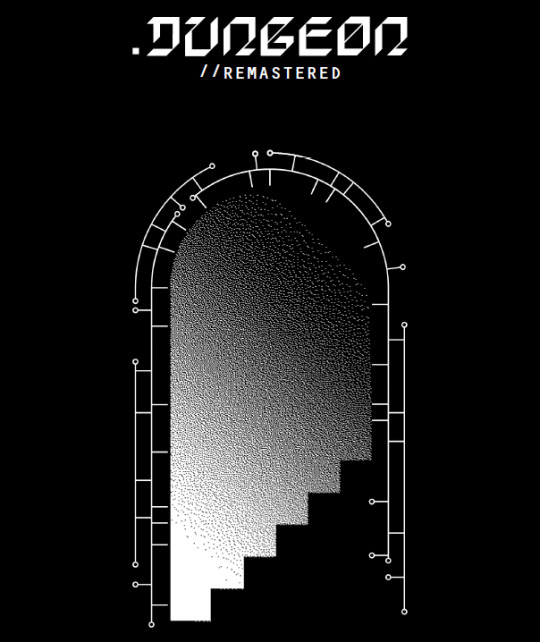
First up, credits! Good folks who do good work in my experience. Also, we get the first of what seems to be a common through-line here that I enjoy: an online fandom bent to this all being a sort of GameFAQ style guide for an in-universe game.
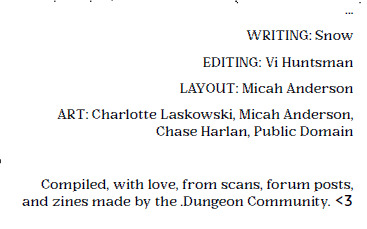
My initial impression from most of the interior spreads I've seen just flipping through it is that I really love the style and layout. I think black and white layouts are underrated generally, but it really pops here with the pixelated text/symbols and the old school GUIs.
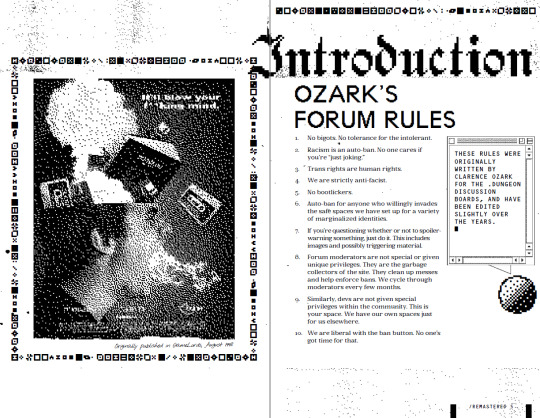
It's interesting to have these kind of "no bigotry" rules you see in many games couched within an in-universe framing. I think this more personal angle actually makes them land better for me than they typically do in games.
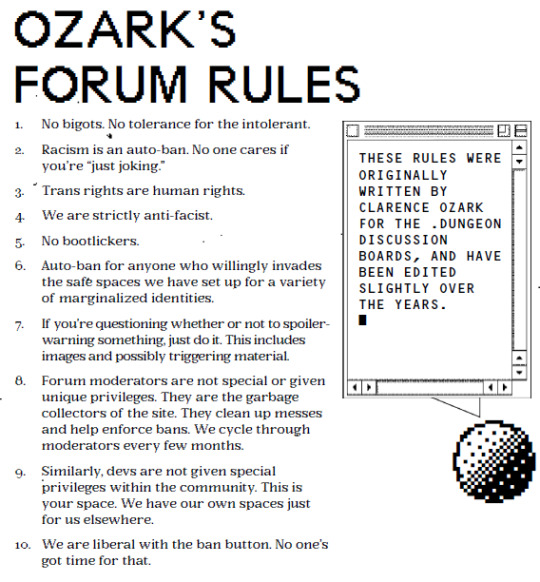
Of course, the author is still powerless to stop the players (just like with any instance of these rules, and all game rules in general tbh) BUT this is worldbuilding too, and it gives me a greater sense for the kind of in-universe fandom that's risen up around .dungeon.
Similarly, here's the game's unique version of safety tools - an in-game help menu that reworks things like lines/veils, x-card and more into the game world itself. I really like this.
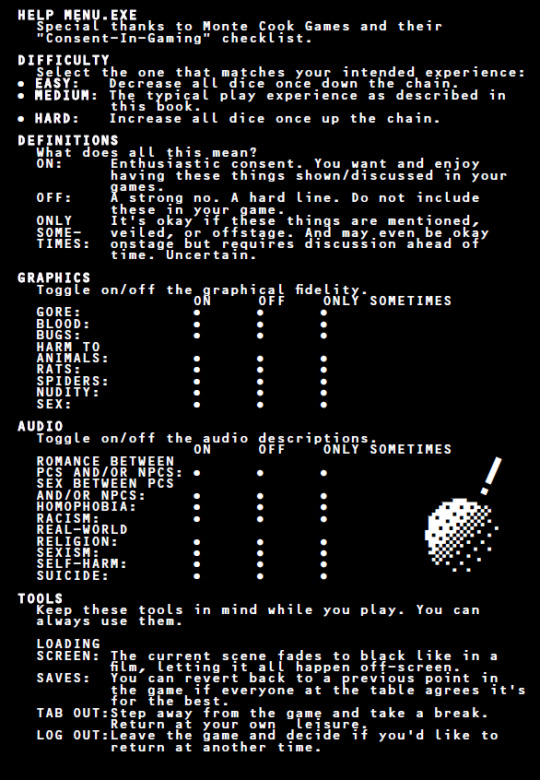
Once again, the art in this is just great. I love the Fez-like runes/symbols. My ARG brain wants to know if there's a hidden message here.

I was surprised it was jumping right into the starter adventure, Tutorial Town, but I quickly found out that this is character creation AND a starting area/adventure all wrapped into one, video game-style, and that's so cool.
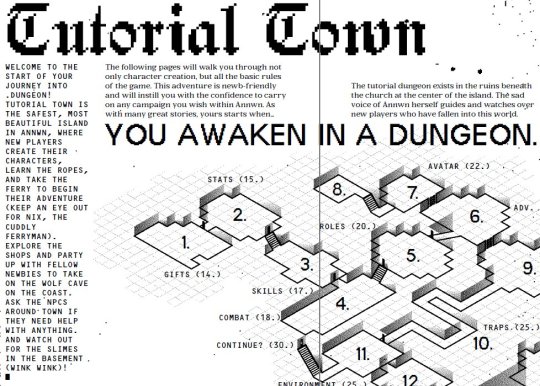
Each room of the starting area introduces a step of character creation. It's interesting that stats are based on real-world (not you the player at the table real-world but your PC at the "real-world" computer playing the game) ability. Your game knowledge, response time, etc.
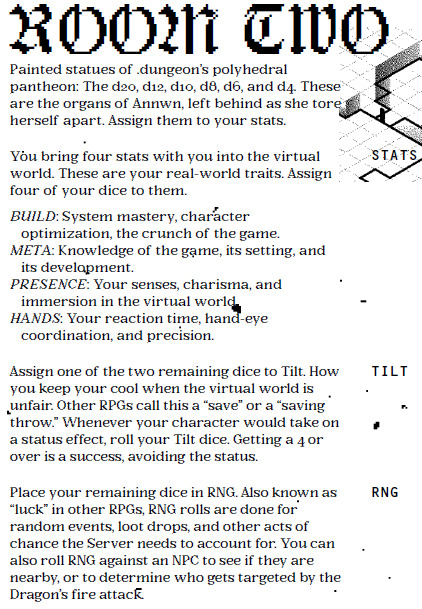
As a long time Dota player, I also just really enjoy that the saving throw-like stat here is TILT. I have tilted many times and known many of my teammates to tilt regularly. Just fun to see that phrasing in a TTRPG.
There's more of the in-universe real-world player here than I expected coming in. Definitely has some really intriguing potential. I do wonder though if the intent is to be playing a "real-world" level character or if you are "playing" as yourself at that layer. Both would work.
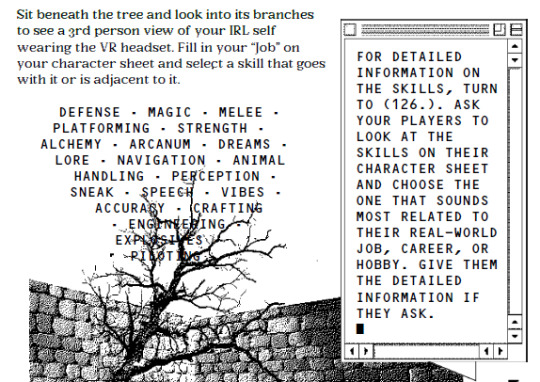
Monster statblocks. Easy to parse and straightforward to run as the GM (tho at time the layout does have one two many things laid on top of one another that can make them hard to read at first glance - like where "GOBLIN" is here):
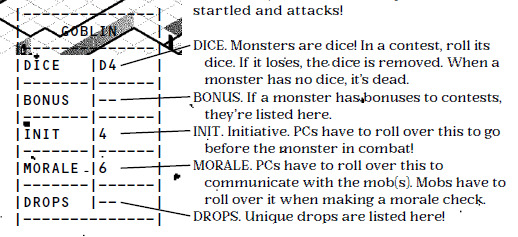
Health here is SYNC, and it's shared across the whole party - I'm interested to see how that full mechanic plays out and how it may affect play.

Reaction rolls. I'm surprised to see them given the video game setting, cus mobs in MMOs just always attack you. I've gone back and forth on it with my video game-inspired TTRPG. Don't think it's a bad choice, just one that means the game world is more than a usual video game.
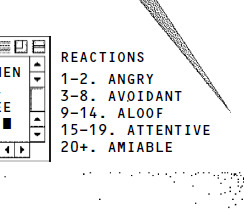
So you have your real-world level Job (based on your characters' out of game job) and your in-game "Role" which follow the classic "holy trinity" of MMO design:
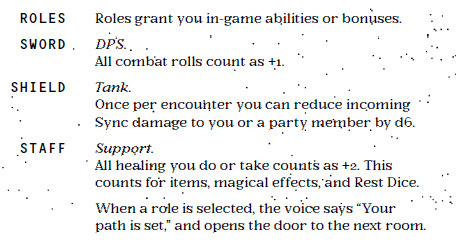
PCs and monsters can team up to attack and can forego damage for stunts - potentially fun/interesting moments happening from that. Monsters deal dmg to SYNC but only per type is interesting, means a crowd of one-enemy is more a long trickle of damage than an overwhelming burst.
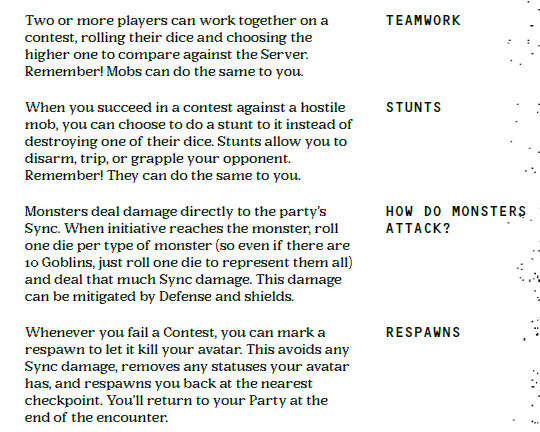
Not knowing the ramifications of SYNC damage yet, I'm not sure what the Risk v Reward looks like for Respawns but it's intriguing. Letting your avatar die to keep the party in a stronger position overall (but being able to re-join after a fight) is definitely unique.
This is another fun room (and I like that other than saying late 90s/early 2000s it leaves appearance options open). I am not sure where to find the starting origins tho (they aren't on this spread and there's no page reference). Sadly, the PDF isn't bookmarked either, it seems.
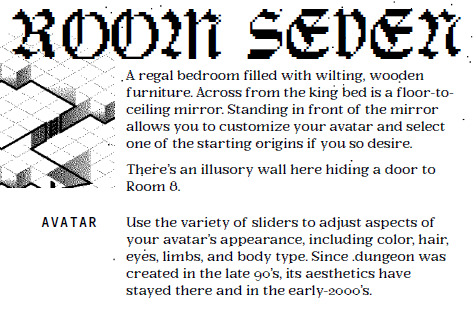
This feels like a smart roadblock to place in player's paths early on. It's unlikely they'll have a lockpick at this point so really, it's about getting players into that creative mindset. What is in the room for you to exploit? What gear do you have you can use in a new way?
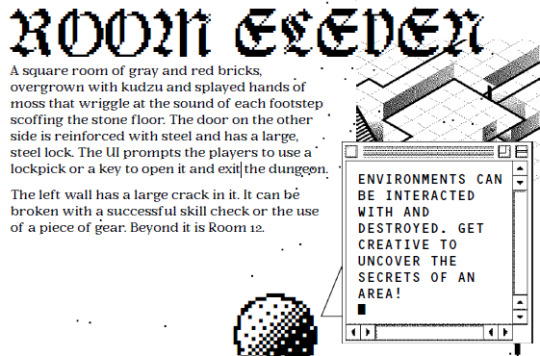
Might seem basic, especially to the OSR-experienced out there, but you'd be surprised how many players don't have experience with thinking more freeformly about the game in this way. No fault to them, most trad games condition you to use your PC's abilities/skills as a menu.
Another cool interaction between the layers of the game here (tho I do wish they all played more off of something more than just the tarot card being in the real-world layer). Still wondering if most folks play as themselves or as a real-world level PC.
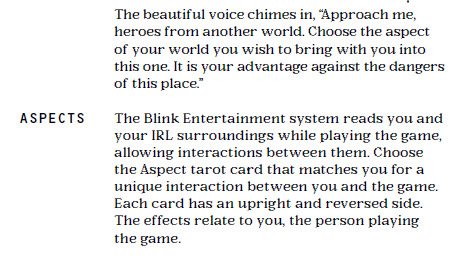
This is interesting. I wonder if there is going to be a real-world layer to play or if this is meant to be the amount your party can heal between sessions of play (like when the actual real you stops playing in actual real life - this meta layer stuff is tricky to communicate).

I like this - a very short and sweet travel system.
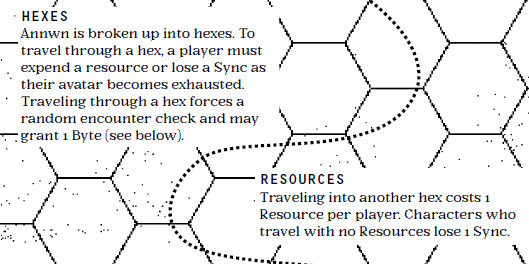
I continue to love this art. Also, this tease here around dual-wielding requiring the discovery of new Roles out in the game world somewhere first is really enticing (I added the highlighter there btw).
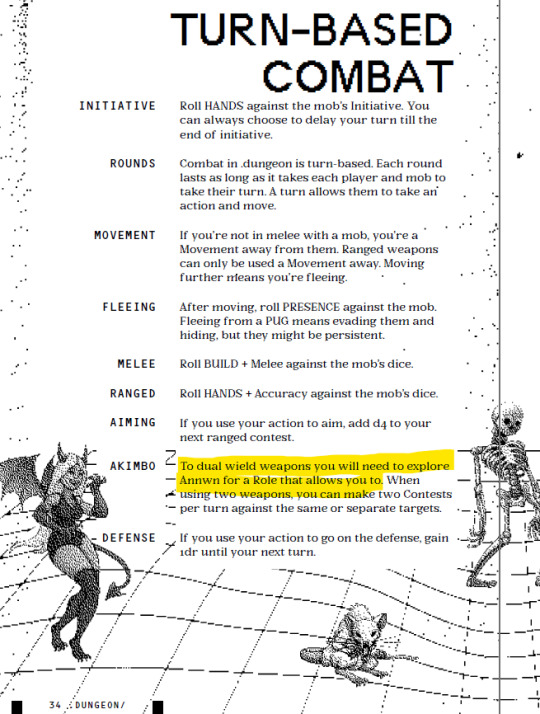
This is fun - there are both in-game NPCs and PUGs which are other real-world players' in-game avatars. That extra layer to those types of NPCs is really fun and them running the gamut of fully out-of-character chatting to being hardcore RPers is fun to consider.
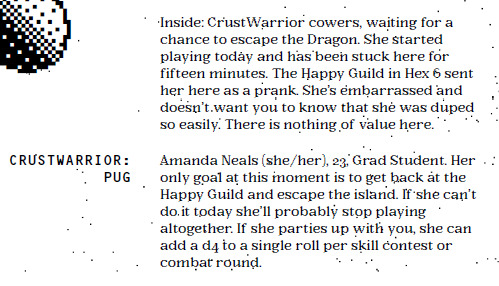
Whenever it leans into the digital world aspects, I'm super into it. Very much my kinda thing. I do wonder though how often players can swap their Roles. I don't believe I've seen that said yet - my inclination would be once on the fly (like Final Fantasy's Job systems).
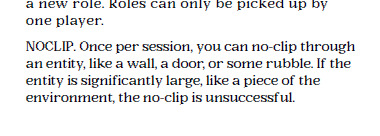
And if these various layers weren't enough, .dungeon also features in-game collectible cards that are sort of enchantments and buffs. I wonder if my real-world level character can spend real money to buy Bytes to buy more packs from a merchant in town? lol
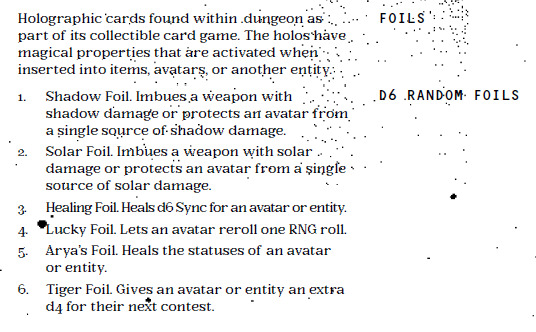
I won't spoil/detail too many more of these but these kind of fun (and common to video games but rarely seen when thinking of the world of a game or the intended way to play) moments are really appealing. Also, this game has Goons in it. Oh no.
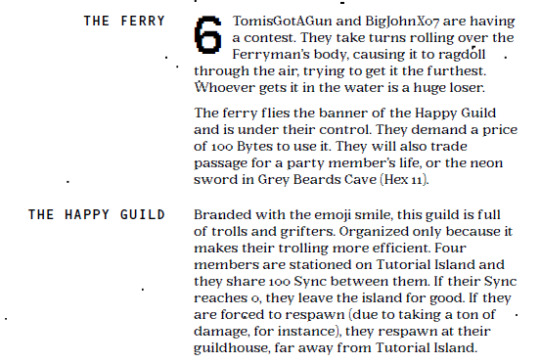
Now I'm thinking the intention is the "real-world" level of play should be the real actual you, the person playing .dungeon the TTRPG (as opposed to a real-world level character still within the fiction of the game) since stuff like this would be tricky to track. Cool item!

Tutorial Island is cool, a good blend of char creation, intro to what the game is, and just a fun adventure with a session or more of play to it. I'd have to run/play this to really see but I find the Sync being tied to essentially your real-world session length interesting.
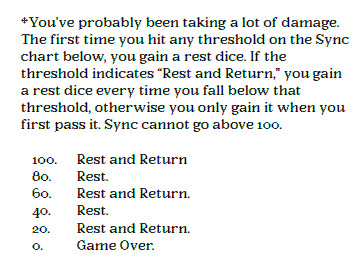
This stuff is cool and leans into that meta/fan-level play that only comes out of these big community-driven games, both MMOs but also things like Dark Souls.

A lot of these kind of possible secrets come as comments in the text, possibly just to inspire the GM and to get players interested in ways that the table can build out on their own over time. So far, I don't see some of the more esoteric secrets to be laid out (which I like).
The rest of the book, as far as I've seen, is lots of resources, gear tables, monsters, etc. to build out the game after player's leave Tutorial Island. The game world here has that anything goes Final Fantasy bent to it. There's swords & wagons, but laser guns & skateboards too.
The setting here is also explicitly queer (mostly seen so far in the "real-world" PUGs) and includes things like sex workers and other elements that it maybe could not have had but that would certainly lessen the richness of its world, the fandom presented throughout, etc.
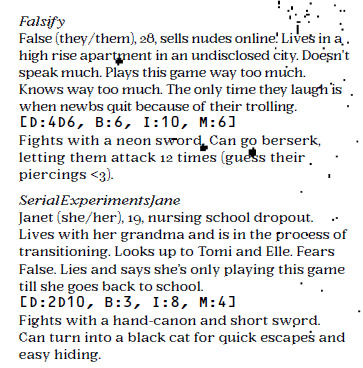
The spellcasting uses the in-game money as mana points essentially. That's a cool way to limit spellcasting and motivate player's, especially spellcasters, to get out there and make some $$$.
Okay, here's the real-world explanation I was waiting for (after the in-game gear lists and such). This is cool - it's fun to have a real-life layer to this and to have the game's world support that sort of dropping in and out, doing things outside of a full party session, etc.
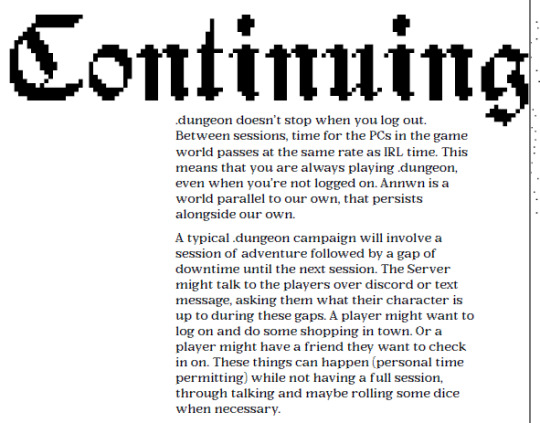
I know a lot of folks do this with ongoing campaigns anyway, but this is one of those fun things to include here to build that in as an expectation in play. You have your raid nights with friends and you have your little solo sessions after work where you sell your loot.
Now, the rest is a nice collection of random dungeon, NPC, settlement, hexfill tables and more. Everything you'd expect from an OSR-like ruleset but occasionally with some fun added meta-layers.
Players getting a quest from an in-game Moderator and then being able to become a Mod themselves is a really fun idea and something I could envision becoming a long-term goal for one or more players at a table. The threat of encountering an Admin is scary as well!
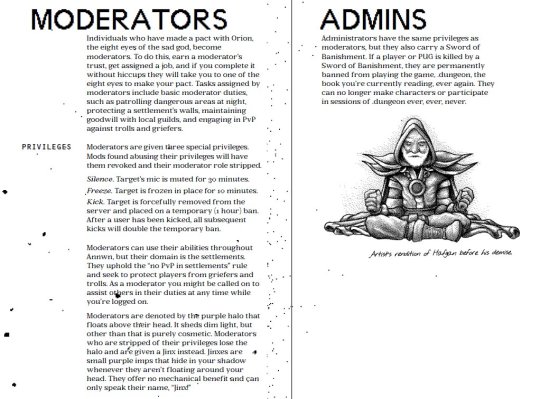
To finish it up, we've got a cool AASCII-style character sheet, complete with MingLiU-ExtB font (my beloved)!
And that's .dungeon//remastered! I really enjoyed reading this, and I think it has a strong core that's really enhanced by its real-world interaction layer. Gonna put this on "Play Soon" list. There are some smart rules in particular I'll likely steal for a future project.
.dungeon//remastered is available digitally NOW with, I believe, physical copies coming soon. I backed the Kickstarter to get this digital version. CHECK IT OUT HERE!
179 notes
·
View notes
Note
I know that mysticizing disability by way of something like dwarves is bad, but what if all of the members of a fantasy race have a feature that humans consider a disability, but humans also have the disability? The story I'm writing has a few characters from Wonderland and I was going to have all members of that homonid species, Wonderlandians, who are very different from Homo sapiens, be autistic by human standards but completely average by the standards for their species. There are also human autistic characters. Is that still mysticizing disability?
Hi! :-)
I think that's fine! If there's humans with the same disability it should be all good; the main issue I see with the "fantasy people have XYZ disability" is that they make being disabled into being a whole different species, which is obviously not how it works and is quite fundamentally dehumanizing. But if there's just a species that happens to have more of something while humans also do, then that's cool I think!
With them being specifically autistic, you have a ton of possibilities for both worldbuilding and wide range of characters. Autism is a huge spectrum and it would be great to feature all types of autistic characters; nonverbal, intellectually disabled, late diagnosed, requiring major support in day-to-day life, having comorbidities that a lot of autistic people also have (cerebral palsy, dyspraxia, ADHD, etc.)! You can also think of how an all-autistic society would differ from one that's made primarily for neurotypical people, from architectural choices or education to just how communication/language would be structured. There's a lot of fun things you can think about!
Also while I don't see any issue with the example you have here, in general try to be conscious what kind of disability you would be associating with a fantasy race, e.g. some could lead to boring stereotypes, or to harmful associations (especially if it'd be a monster or "scary" race).
I hope this helps!
mod Sasza
38 notes
·
View notes
Note
Top five time travel movies/books! :D
See, the trouble is that while I love time travel as a concept, I haven't actually explored the genre that much. I haven't watched/read most of the time travel stories out there, sometimes because I just haven't gotten to it, other times because I'm very picky about content, other times because most of the time travel stories I run across are either "we're a bureaucratic agency dedicated to policing time travel" or "oh, no, what if we change history?" or "I fell in love with a hunky Highlander", none of which are the parts of time travel stories that interest me.
The most accurate version of this list would be a list of Doctor Who episodes (and maybe some Star Trek ones), but you specified movies and books, which is going to make this a much more difficult list to create.
The Day of the Doctor: Haha, I cheated, because Day of the Doctor was released in theaters, which makes it a movie! (So I can use it as a stand-in for all the Doctor Who episodes that are my favorite time travel stories). Thankfully, it's a fantastic time travel story and one of my favorites. It's a genius blend of both "stable timeline" and "changeable timeline" mechanics. Three different interweaving timelines. References to A Christmas Carol. Changing major events in the show's past without changing the timeline that resulted from them at all. A rejection once and for all of the "ends justify the means" mindset that had lingered over the reboot for too long. A masterpiece.
A Christmas Carol by Charles Dickens: It's the classic Christmas story for a reason--and one of those reasons is the time travel. Going with Scrooge across decades of his own life and watching him undergo character development from that is a great use of time travel. (And there happens to be a great Doctor Who version, too!)
Star Trek: First Contact: It's fun when you get characters traveling from the future to a different time that's also in the future. Love all the worldbuilding details of these characters interacting with their past/our fictional future, and it's a pretty good story.
Shadowhand by Anne Elisabeth Stengl: The Tales of Goldstone Wood series has a structure unlike any I've ever seen in fantasy, and this book is the reason. The first three books in the series are in chronological order. The next two books are prequels that take place like a thousand years earlier. This book, the sixth, involves characters from the later time period time-traveling to meet characters from the earlier time period, and getting swept up in a legend that they've known since childhood. I remember very little about the book beyond that, but it's such a cool concept (with an unforgettable ending moment) that I have to put it on the list.
Love Strikes Twice: It's one of the very rare Hallmark movies that's actually a decent movie by normal movie standards, so I have to give it credit. Instead of the usual boring time travel plot of "oh no, what if we change history?", we get someone who's trying to change history, who does change history, and it's a good thing. The time travel mechanics surrounding that make no sense, but who cares? It's a fun story with an engaging cast, legitimately funny jokes, a sweet romance, and a solid plot.
#answered asks#time travel#doctor who#star trek#the tales of goldstone wood#a christmas carol#love strikes twice#this ask did prompt me to pick up 'to say nothing of the dog' again#i couldn't remember why i abandoned it#a quick search of the ebook proves that the language i thought was a deal-breaker wasn't in it#so i'm giving it another shot#i may abandon it in the same place who knows but at least it's worth a try#also fun fact#the other day i saw a hallmark movie on in the background#i saw one scene and was like 'huh this looks like a higher-quality production than usual'#looked it up and learned that it was another time travel story written by the writer of no. 5#and i was like 'man am i good at identifying these'#so as soon as i decide to spend a hoopla credit on it i am going to watch another fun silly time travel romance
26 notes
·
View notes
Note
i dont send asks often and am kinda nervous but i discovered this blog after starting a fantasy worldbuilding thing ive been doing and i want to ask, should i be considering like, physics and the square cube law? it feels silly but i want my designs to feel plausible and biologically accurate, with my own twists on fantastical creatures.
dragons, specifically, are usually very large creatures, they also often fly. these are traits i want to keep, and have it still feel fantastical, but here are obvious issues here. there is magic, and it is connected to the world, and i could do something like changing gravity or atmosphere, but just saying it's magic feels like lazy cop-out, and changing the laws of physics is too drastic not to be explored, which feels to extreme for one creature. am i overthinking things? can i just handwave this sort of thing? i often don't see fantasy settings explore that sort of thing so idk im kinda lost here
You can hand wave a great deal of things and still also make fantasy creatures that feel plausible. My centaurs have the unusual biology of being born with extra limbs and ribs because they're all chimeric twins. I'm pretty sure it's genetically implausible for an entire species to be born with such remarkably consistent fused anatomy like that. But it's just enough of an explanation to make it feel a little more believable.
For dragons, I like to remind myself that humans have created airplanes at least as big as the average dragon and they work just fine. So maybe you can research how planes work. There are engines, certainly, but planes stay in the air despite being giant heavy metal tubes because of the way their shape interacts with air currents, essentially. So instead of flqpping a lot like a smaller animal, maybe your dragons are more like long distance soaring animals. Albatrosses come to mind. Getting off the ground is another problem, which can be solved by having the dragons soar from high places like cliffs and mountains.
You can also look to prehistory! The quetzalcoatlus was a pterosaur roughly as big as a giraffe and as far as science has determined, it could fly and even launch itself into the air from flat ground.
Here are a few more tips for making large dragons believable:
- bird bones. Contrary to popular belief, they're not completely hollow and they're not actually much lighter than mammal bones. But the open spaces and the mesh-like structure inside them give them a different sort of density and strength that helps them fly, as well as providing more space for internal air sacs that actually help them breathe more efficiently. (I'm on my phone right now, I'll add a source for that later) and we have evidence that this sort of air sac also existed in large dinosaurs like the diplodocus. Dragons probably would need similar structures in their bones.
- hot air balloons. Hot air rises and dragons breathe fire. Make use of those extensive air sacs and fill them with hot air! How dragons manage to have so much heat inside as reptiles is something you can hand wave with magic or find various science-type explanations for doeending on your mood. I like the idea in dungeon meshi where the dragon has a second stomach-like sac for the indigestible parts of its prey and uses that for fire fuel! It's very clever. Dragons may not be as thin and soft as a balloon, but having a body full of air sacs that carry hot air is a reasonable explanation for how dragons fly despite their size.
- wing shape and body shape! Long distance fliers that soar more than they flap usually have very long, narrow wings. And most flying animals also have shorter, rounded bodies. The dragon wing membrane should cover their whole side, from the shoulder to the hip, with a really big wingspan. Their tails probably shouldn't be all long and whippy and full of dense muscle, but maybe they can be flat and broad to catch air or maybe the wing membrane extends to the tail. Maybe you have tailless dragons! Just don't let the tails add too much weight or they'll make flying a lot harder.
- propulsion. One magic explanation I think would be interesting is if dragons used magic like airplane engines. Trying to work out magical gravity fields and atmospheric magic is cool and fun. But it seems like it would be easier for dragons to just have magic jet engines if you want to use magic to explain their flight. And it's fun!
I hope those are all helpful ideas! Dragons are cool and I love to see people messing around to make them more believable. There is nothing wrong with using a little magic fudge in fantasy worldbuilding either! It wouldn't be very fantasy if it always had to follow a hard science system. You can leave that to the scifi genre haha. But if you're going to dive into realism in fantasy, it is more fun to see people really dive deep and get weird with it and explore all sorts of interesting extra details, rather than just dipping a toe in and hand waving the rest. Maybe it's just the neurodivergence in me, but I always have more fun with fantasy stories if it feels like the creator had a real passion for the weird details and didn't just follow a standard fantasy template.
38 notes
·
View notes
Text
The issue I see with the ESO Dark Heart of Skyrim depiction of Reachfolk is primarily the division between "ethnic/indigenous" stereotypes, e.g. living in "tribes" in the middle of buttfuck nowhere and being hostile to outsiders, and the "civilised" Reachfolk who are depicted as far smarter because they live within the relatively safe confines of Markarth with taverns and banking services and other city crap that are the benchmarks of modernity and Tamrielic civility.
There is no reason beyond blind ethnocentrism that this is a division that exists, either in real life or in fantasy (if we allow the latter to truly break the bonds of fiction into something *better*). So-called "primitive" peoples, be that the Azande or Trobrianders, have been subject to ridicule due to their indigenous knowledge, myths, and beliefs as unaligned with our post-enlightenment, postmodernist, scientific worldview. In the eyes of many writers, projecting what is deemed within their worldview to be "good" for their characters is really a detriment when it comes to original worldbuilding.
At the risk of sounding like yet another unhinged Marxist, my final comment concerns the structures of Reach society. The hierarchical structure of Reach clans is not something I'm super familiar with so I may come off as sounding like an idiot here, but bear with me. Why are Reachfolk, with supposedly primitive and unchangeable belief systems, upheld to the societal structures of mainstream Tamrielic groups? Why would they trade with gold, if they traded at all; and if they didn't, someone needs to do some research on the historical basis of global trade, which cough cough involves cooperation and amicable relations between disparate groups over huge distances and periods of time. Why are the Reachfolk exempt from this cycle of amicability? Is it more thrilling to write them as hostile savages, ready to attack anyone who supposedly threatens their way of life?
Yes, they would be thoroughly aware of the dangers of colonisation. But why have city Reachfolk been portrayed as sensible citizens of Tamriel while their brethren in the wilderness are presented as wild, IGNOBLE savages? Where is the justice in portraying indigenous peoples as they truly are and are capable of, rather than re-used Western tropes surrounding the division of self and savage Other?
Once again, this ties into the prominent Western tradition of Othering those who don't follow the tenets of a monotheistic, hegemonic, organised religion, or similarly prescribed worldview. By not including Aedra worship in Reachfolk culture, they are seen as savages and people who should be civilised and brought into the fold of the Divines. There is a pervasive undertone of violence linked to so-called "primitive" groups in TES, and this may just be to make convenient NPC bandits, but also perpetuates a stereotype that deeply harms real-life indigenous and culturally marginalised groups.
This is why careful worldbuilding is so so so important because we can project the world WE want, free from the socionormative biases that taint fantasy writing. Yes it's necessary to draw inspiration from real life, I do it all the time, but there's a point where you say "what if real life isn't that great of an idea to project here?"
I'd like to conclude by saying that I'd like to see this decolonisation of fantasy writing extended to other socially marginalised and misunderstood groups in TES, such as Bosmer, Argonians, giants, minotaurs, and the Bandaari (I could rant about them all day but I have other writing to attend to). We can do so much better not only with our ability to create some truly original fantasy worldbuilding, but also by showing others that by decolonising our own writing, we are becoming more sensitive to the worldview of others and incorporating that in an insightful and respectful manner.
242 notes
·
View notes
Text
Feeding a Flying City
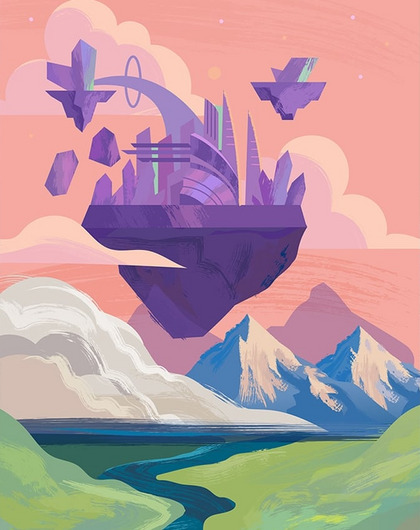
[Aeor, by Pretty Useful Co.]
This started as a little exercise in my worldbuilding thoughts for some off-hand stuff mentioned in my current fic, but I uh. Got Into It. So enjoy, if you're into two thousand words of nerding out about fantasy economics and agriculture and spells. For the sake of context, this is specifically looking at Exandria's flying cities in the Age of Arcanum, working off D&D 5E's rules as written (so I'm avoiding inventing spells).
When tackling the Age of Arcanum in my fanfic, I knew going in that I wanted to use this space to stretch my worldbuilding muscles and fill in some of the space left by Matthew Mercer and Brennan Lee Mulligan with reasonably plausible meat and bones.
One thing I was excited to squint at was the issue of how the hell flying cites feed their populations.
The ‘lonely city’ is a common fantasy trope, especially in visual media. Your towering bastion of civilization (or spire of evil) on the open plains, or beside a river, or deep in the mountains certainly makes for a great symbol. A flying city is really the ultimate version of this, completely disconnected from the petty ground below… and the farmland that usually would surround any metropolis.
See, in medieval times, you only had so much time to transport good until they spoiled. Some could be more forgiving than others - however, given a city often aggregates political and financial elite, there is an expectation that they can get their fresh fruits, and decadent game. Even beyond freshness, if you have a lot of people in one place who are not actively growing their own crops, a lot of more-or-less processed food needs to get into the city daily. And though you could station your acres of farmland just over the hill so they don’t ruin the ~scenic approach~, that will cost more to transport. The fact is, having a lot of people - poor and rich - in one place requires a lot of food, every day, to feed them. And it has to come from somewhere.
(Off-topic note, medieval castles (not necessarily cities) were also there to, y’know, defend the populace. So they had to be both near enough to their peasants to respond to aggression, and near enough for the people to get to the castle for shelter when needed. Which is not relevant to this point.)
Magic, like refrigeration, greenhouses and GMO crops, allows a society to sidestep some of these issues. Which is great! But how the flying cities could use the resources they have to feed their population is half the fun in theorizing.
To quickly recap what we know to be common to flying cities of the time:
Limited to the city only, usually a location with ground dense with brumestone (i.e., no farmland).
Their limited ‘undergrounds’ are often fairly dense with more structures (Aeor’s many levels; the labyrinth and tons of administrative locations inside Avalir).
They are nomadic and engage in trade (both with eachother and grounded cities, like Vasselheim).
… but they all likely came from landed roots, and potentially were once perfectly normal cities.
So. How do you feed your people while flying a path that might take years to travel (ex: Avalir’s 7-year trek), especially between trade stops?
The last surviving flying city is Draconia, which is really fragments of a larger nomadic city that decided to remain fairly sedentary compared to its predecessors. Its answer was probably pretty simple: given that Draconia hovered within Dreemoth Ravine, the tailed dragonborn could just… collect a tithe of crops from the enslaved ravenites. It’s already canon that they were put to work in the mines, so working the land also unfortunately makes sense. It’s unclear how the food then got up to the city (skyships, given they have ready brumestone access?), but given Draconia seems to be an exception to the rules I can (mostly) confidently rule out ‘the Age of Arcanum was built on abusing the grounded cities and towns, potentially requiring an age of magically-enhanced farming to provide for the people above and/or risking the farmers going hungry in favor of the mageocracies’.
Here’s where magic offers numerous solutions, and just as many weird problems!
First of all, the stupidly isolated nature of flying cities means that any method of bringing food in has to be extremely structured. Mom and pop can’t just bring the donkey to the farmer’s market to sell their goods in Avalir; to get there you need to fly (more scheduled) or teleport (requires a mage, and limited quantities of goods). So from the getgo a lot of financial control is likely in the cities’ hands. Which… is not all too dissimilar from history, but the lack of flexibility is probably more striking here. Shit, I was hoping to get away from Draconia’s grim worldbuilding.
It also places flying cities in a role very similar to an advancing army, requiring food as they march to be drawn from the surrounding lands. While soldiers can break off and loot towns they pass through, a flying city probably can’t just dock in the middle of farmland, grab all the corn and bolt. So the need for a more organized food transport likely helps protect towns from that exploitation. (Though, with the military posturing of Avalir and Aeor, I could see flying cities strong-arming support from grounded ones in exchange for promised protection/aid if they needed it.)
Of course, when docked at another city (Avalir stayed at Vasselheim for ten days in the weeks before the Calamity), they can fairly easily trade with the surrounding towns there… who are also providing for the existing city. Hosting a flying city must be a huge logistics nightmare, but economically worth the headache.
(Vasselheim likely has a leg up in that it has both a sitting population of mages, such as Vespin pre-fuckup, and the likes of Clerics, who I’ll get to soonish.)
In EXU: Calamity, skyships (and an offhand mention of something called an ornithopter) already exist, which could facilitate the bulk transport of goods. Based on the speed of the Silver Sun in Campaign 3 (4-5 days to cover ~700 miles translates to a speed of ~5-6.5 knots; for context that seems to be about the middling range for a medieval tradeship), this seems like an excellent way of transporting goods that do not spoil easily. Or use arcane equivalents to the canon Bag of Colding to help keep things fresh longer. However, as noted above, this would require a lot of community organization to get crops together when the skyship shows up for harvest.
The tricky thing is that Avalir, at least, follows leylines as it travels. So if there was intent to line up its passes over farmland with their harvest season - to minimize transport distance - it might be difficult to coordinate. Moreover, with an implied many flying cities, and no clear territorial delimitations between their routes (especially if they’re all following leylines; but Avalir at least made stops in Issylra, Gwessar/Tal’Dorei, and Dorumas/the Shattered Teeth at least), I wonder if there would be economic conflict over which cities could be highest bidder for the freshest crops. Which could be Interesting.
(I wonder if sky piracy, or sky privateering, was a thing in the Age of Arcanum. Nydas is said to have been a pirate on the actual seas, so aquatic trade is still going strong, but given the flying cities are so reliant on limited methods to get food… you could put a lot of pressure on a rival city by capturing a few key skyships full of the last harvests before winter.)
Another option is teleportation. Avalir, after all, has an entire guild devoted to teleporting people around, so critical to its functioning that part of the Betrayers’ plan was to leave them without leadership when they struck. However, teleportation is very much a creature-oriented form of transportation; perhaps you could bring up a herd of cattle for slaughter, but that’s a pretty damn high spell slot for beef.
Avalir is in a fortuitous situation, in that it has a longstanding relationship with the Gau Drashari; druids, well-known masters of plant and animal life. In theory, this could mean Plant Growth casts to increase harvests… but at this time the Gau Drashari specifically only live in Caithmoira, guarding this holy site. So hopping from one druid-boosted farmland to another is unlikely.
Well, if transporting food to the cities is such an issue, why not produce food in the cities?
While magical greenhouses must account for some luxury fresh goods for sure, I really don’t think the cities as illustrated have enough real estate to actually support their whole populations like this. Like I noted above, of the two cities we know really well, their insides are already full of labs and labyrinths and all sorts of things probably best kept away from your food supply.
D&D 5E spells offer another answer, and another piece of potentially complicated worldbuilding: Create Food and Water. Per the spell description, it creates enough food to feed 15 people for 24 hours, which seems to neatly solve all our problems! Until you realize the food is explicitly bland (bet you the mages turn up their noses at it), vanishes if not consumed after 24 hours (so that’s a daily 3rd level spell slot from some poor schmuck), and is mostly limited to Paladins and Clerics. You know, godly people, who are so fondly looked upon by the mageocracies. Artificers, at least, are more in line with the Age of Arcanum attitude - but we don’t see any in Calamity, so it’s unclear if the class ‘exists’ per say in the time period. Reducing powerful Paladins and Clerics to food dispensaries - and not even good food, probably for the lower class - would fit in neatly with how the powers of the divine are seen as lesser. Goodberry falls into a similar role: useful, but probably something mages would avoid.
Speaking of spells, let’s get a little fucked up, hm? Who is to say a mage couldn’t just. Summon some pigs to be served up as bacon tomorrow? Well. Conjure Animals specifically says the animals are actually fey, and vanish when their HP reaches 0. Summon Beasts? Same thing. Find Steed? You guessed it. So magic can help us grow food, and transport it, and preserve it, but not actually make it out of nothing. (If there’s a spell I’m missing that completely solves this, please let me know, but I can’t really find one.)
My final little thought came watching geese migrate some time ago. The passenger pigeon has been extinct for… a hundred and ten years, now. But in its hayday, flocks of the birds would literally cloud the sky. Exandria is home to far more stunning beasts than pigeons, and hunting flying game is likely a lot easier when you yourself are flying too.
Sure, you can apply this to actual fishing when the cities are over the seas, but! Imagine fishing boats but for birds and all manner of winged beasts in great flocks, netting and catching them to haul in. Maybe the magical equivalent of those helicopter boar hunts to deal with invasive populations, but landing at all introduces a whole lot more hassle. Big net and flying device = fresh meat, with an arcane twist.
So: how do you feed a flying city? Especially one with a lavish lifestyle as seen in Avalir, or a hard research focus as in Aeor?
Have an extremely regimented relationship with the towns on your path (likely in competition with other flying cities using these leylines when you are) or that otherwise have food you need. Make sure skyships arrive in time for the harvests. Miss that and things get dicey.
Supplement this with trade, both with other flying cities and grounded ones when docked. However, docked time has to be limited to not risk starving out the countryside surrounding the city hosting you.
Small deliveries, especially of fresh livestock, can be accomplished through Porter’s Guild or equivalent.
Magically preserve food thus obtained to survive until your schedule and harvests of X Y z goods next align.
City-based organizations can ‘fish’ for birds as the city flies (or potentially even actually fish as they fly over the ocean) for fresh meat.
Hope to gods (but without hoping to the gods because they’re schmucks) that you time your pick-ups right, that there are no famines, or early frosts, that no one steals your fucking skyships our outbids you on a key agricultural contract, or casts Dispel Magic and makes your food all spoil.
When the carefully-scheduled management of the city’s resources fails, turn to your diviners or healers and have them feed the masses with bland crackers while the Somnovem or Ring of Gold continue eating honeyed lamb and figs.
If you read this far, I'm super flattered you shifted through my rambles! I'll gladly discuss any glaring mistakes or things I've overlooked; this is only what I considered in worldbuilding for a fic, and I don't pretend to be an expert on medieval agriculture or economic practices.
This was still very fun to (over)think about <3
(Water, of course, would be a similar limiting factor, but is easy enough to magically purify, and would not be too bland when made by Create Food and Water, so I didn’t bring it up.)
126 notes
·
View notes